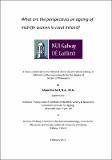| dc.description.abstract | Adopting a lifecourse perspective, this exploratory study examines what rural ageing means to mid-life women (45-65 years of age) in Connemara. Gaps in existing research coupled with divergence between theoretical and empirical perceptions on gendered mid-life ageing indicate the importance of developing new empirical studies to capture the diverse experiences of this growing population group. Drawing on these divergences, this qualitative study adds to the body of existing knowledge, offering new insights within an Irish, rural context. Methodologically, constructivist grounded theory was employed to facilitate the discovery of fresh perspectives and emerging theory on gendered mid-life ageing. Twenty-five diverse participants were recruited using this methodological model, and their narratives, obtained by semi-structured one-to-one interviews were inductively analysed. Themes emerging from this study’s grounded theory analysis led to the adoption of ‘quality of life’ as an overarching concept. This fluid, subjective concept was shaped by the secondary categories of health, social relationships, place, and work. Categories were found to be inter-dependent, strengthening the case for studying gendered ageing from a multi-contextual background that includes such influences as health, social relationships, geographical place and attachment, work and life purpose, and self-identity. ‘Single issue’ studies of ageing are less likely to offer the depth of understanding needed to inform policy and literature. Findings show that participants sought balance in their mid-lives, adopting and adapting behaviour in preparation for older age. Most enjoyed mid-life, citing wisdom and confidence, often missing from earlier lifecourse stages, and most anticipated new opportunities in self-development in the years ahead. Reported negative aspects of mid-life included fatigue and stress brought about by over-busy ‘multi-role’ lifestyles; concerns for older age were situated around dependency and reduced autonomy. | en_IE |


